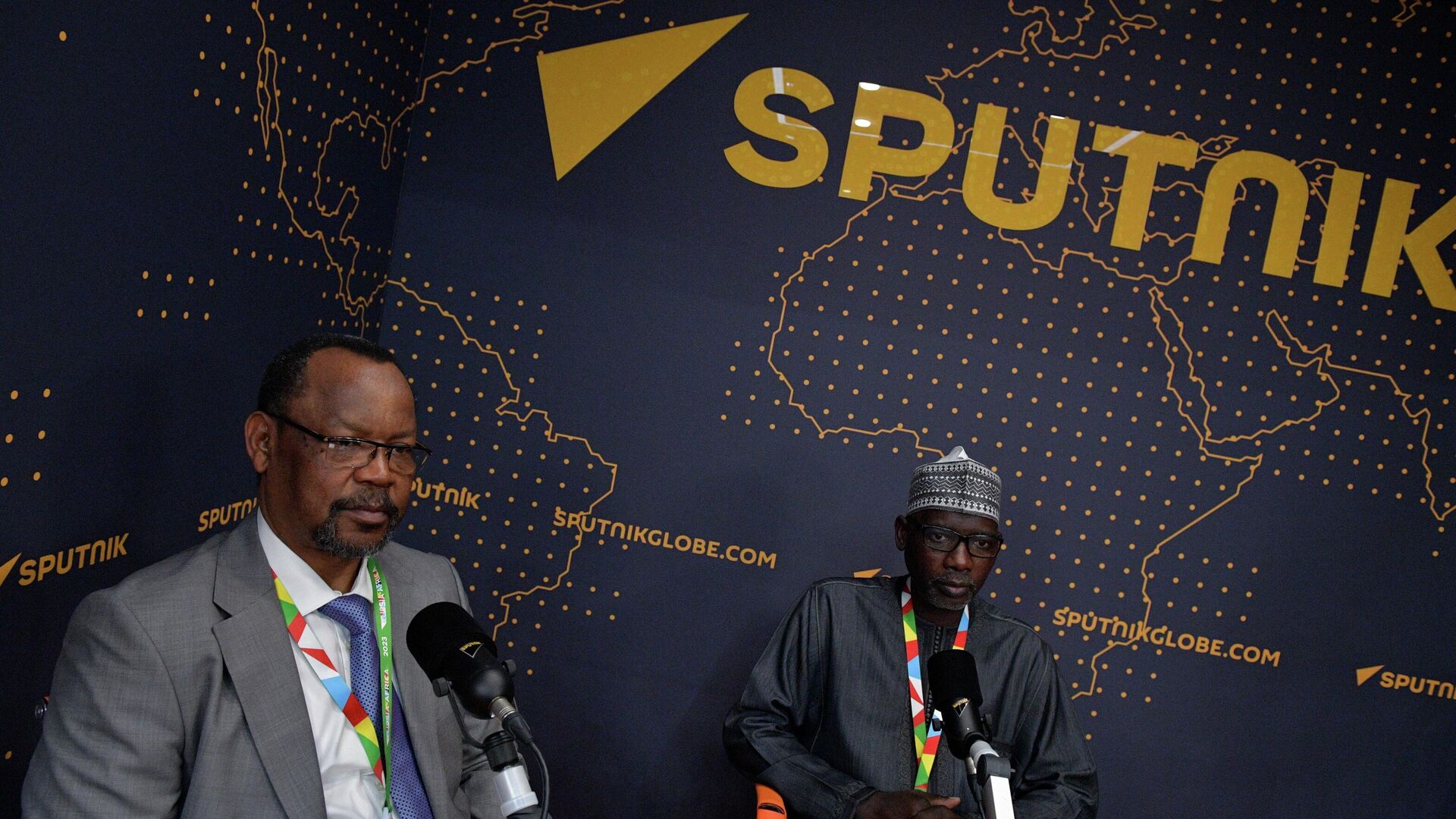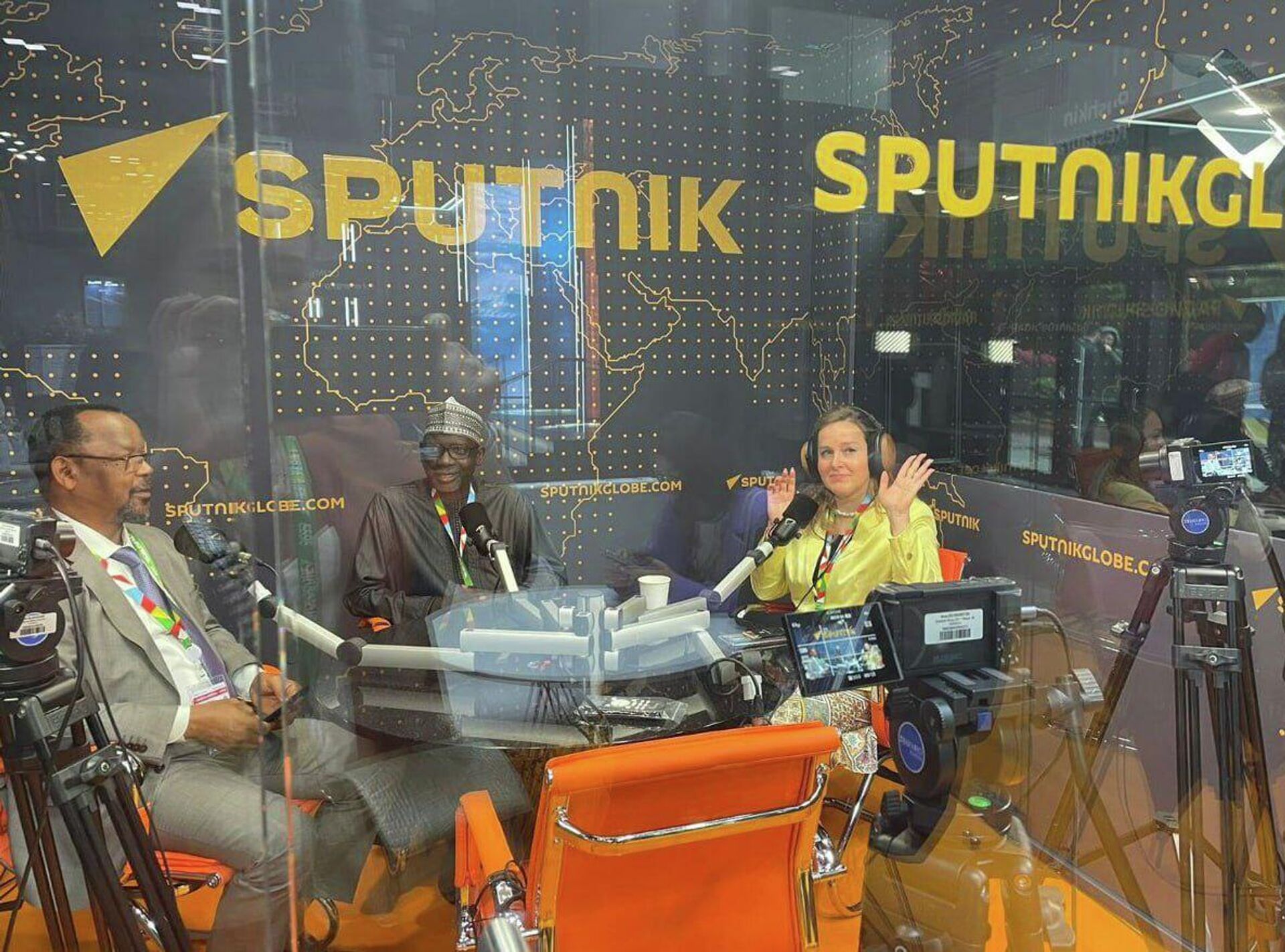https://en.sputniknews.africa/20230802/very-rewarding-nigerian-media-heads-praise-russia-africa-summit-spotlight-positive-impression-1060985145.html
'Very Rewarding': Nigerian Media Heads Praise Russia-Africa Summit, Spotlight Positive Impression
'Very Rewarding': Nigerian Media Heads Praise Russia-Africa Summit, Spotlight Positive Impression
Sputnik Africa
In an exclusive interview on the sidelines of the recent Second Russia-Africa Summit in St. Petersburg, senior Nigerian media executives expressed their... 02.08.2023, Sputnik Africa
2023-08-02T11:15+0200
2023-08-02T11:15+0200
2023-08-02T12:12+0200
second russia–africa summit
west africa
nigeria
russia
saint petersburg
media
https://cdn1.img.sputniknews.africa/img/07e7/08/02/1060996671_0:143:3134:1906_1920x0_80_0_0_5ae9b9769114946d38e357e2f8b89ae8.jpg
Salihu Dembos, Director General of the Nigerian Television Authority (NTA), and Mansur Liman, Director General of the Federal Radio Corporation of Nigeria (FRCN), shared their thoughts with Sputnik Africa on the Second Russia-Africa Summit, emphasizing the positive reception they received from the Russian people.The two Nigerian executives took part in the media forum held as part of the Summit, which was attended by distinguished Russian and African media executives.Dembos highlighted that the experience of participating in various activities and conferences during the two-day event and their visit to Russia in general was "very, very rewarding".No Country 'Better Than Russia'When asked about their impressions of Russia prior to their visit, both media officials admitted to holding preconceived notions that were quickly dispelled by their firsthand experiences.The head of the Nigerian Federal Radio Corporation ascribed these misconceptions to the biased portrayal of Russia by Western media outlets and urged agencies like Sputnik Africa to continue transmitting a more accurate image of the country.Echoing the FRCN boss's sentiment, Dembos conveyed his awe at Russia's remarkable development. Dembos emphasized the importance of visiting Russia in person to truly appreciate the transformation the country has undergone, adding, "For me, my impression is that there is [no country] better than Russia."Neocolonialism, Media SovereigntyWhen asked about the possibility of neocolonialism through the imposition of sanctions, Dembos acknowledged the divide between the views of Russia and that of Western powers like the United States. He appreciated the steps taken by the Russian government to counter this divide and emphasized the importance of alternative options and global opinions.Emphasizing the pressures Africa faces from Western nations, Dembos expressed gratitude for the support offered by Russia, including the delivery of free grain to ensure food security and the provision of agricultural expertise to promote self-sufficiency.The conversation then shifted to media sovereignty. Liman commended the Russia-Africa Summit for offering African countries alternative options, giving them the power to exert their own sovereignty. He stressed the significance of African nations having choices beyond traditional Western partnerships, stating that these alternatives strengthen individual countries' independence.Russia's "Isolation"When asked about Russia's global position and whether it is isolated as often portrayed in the mainstream media, Dembos suggested that Russia should prioritize the dissemination of information, particularly on the African continent.He highlighted Russian President Vladimir Putin's proposal to introduce the Russian language into African educational curricula, stressing that such a move would cultivate stronger ties and overcome language barriers.Dembos and Liman also discussed the ways in which African and Russian media can collaborate to foster a multipolar world and combat misinformation.Dembos highlighted the importance of collaboration between media organizations through training programs, program exchanges, and news content sharing. He advocated partnerships between Russian media organizations and Nigerian authorities, emphasizing the need for authentic information. The head of the Nigerian Television Authority suggested that working together would allow both countries to access accurate and reliable news, dispelling any distorted information propagated by other sources. In his turn, Liman emphasized the importance of providing balanced and accurate news to audiences, stressing the necessity of obtaining firsthand information from the countries involved in international events.He believed that through partnerships, media organizations could deliver balanced information, enabling audiences to form their own opinions based on accurate reporting.Dembos added to Liman's remarks by recommending that the Russian government establish a strong and visible media presence in various African languages. In his opinion, by doing so, the Russian press would effectively fight off misinformation and fake news, ultimately contributing to a more informed global audience.
west africa
nigeria
russia
saint petersburg
Sputnik Africa
feedback@sputniknews.com
+74956456601
MIA „Rossiya Segodnya“
2023
Muhammad Nooh Osman
https://cdn1.img.sputniknews.africa/img/07e7/04/0a/1058467512_0:0:1280:1280_100x100_80_0_0_ec723833bcbfcaed2e21952965ad99e4.jpg
Muhammad Nooh Osman
https://cdn1.img.sputniknews.africa/img/07e7/04/0a/1058467512_0:0:1280:1280_100x100_80_0_0_ec723833bcbfcaed2e21952965ad99e4.jpg
News
en_EN
Sputnik Africa
feedback@sputniknews.com
+74956456601
MIA „Rossiya Segodnya“
Sputnik Africa. In the footsteps of the Second Russia-Africa Summit with Nigerian media professionals
Sputnik Africa
In the footsteps of the Second Russia-Africa Summit with Nigerian media professionals
2023-08-02T11:15+0200
true
PT27M16S
Sputnik Africa
feedback@sputniknews.com
+74956456601
MIA „Rossiya Segodnya“
Muhammad Nooh Osman
https://cdn1.img.sputniknews.africa/img/07e7/04/0a/1058467512_0:0:1280:1280_100x100_80_0_0_ec723833bcbfcaed2e21952965ad99e4.jpg
west africa, nigeria, russia, saint petersburg, media
west africa, nigeria, russia, saint petersburg, media
'Very Rewarding': Nigerian Media Heads Praise Russia-Africa Summit, Spotlight Positive Impression
11:15 02.08.2023 (Updated: 12:12 02.08.2023) Muhammad Nooh Osman
Writer/Editor
Exclusive
In an exclusive interview on the sidelines of the recent Second Russia-Africa Summit in St. Petersburg, senior Nigerian media executives expressed their admiration for the warm reception they received and the progress they witnessed in Russia during their first visit.
Salihu Dembos, Director General of the Nigerian Television Authority (NTA), and Mansur Liman, Director General of the Federal Radio Corporation of Nigeria (FRCN), shared their thoughts with Sputnik Africa on the Second Russia-Africa Summit, emphasizing the positive reception they received from the Russian people.
The two Nigerian executives took part in the media forum held as part of the Summit, which was attended by distinguished Russian and African media executives.
Dembos highlighted that the experience of participating in various activities and conferences during the two-day event and their visit to Russia in general was "very, very rewarding".
"Russia should continue to do this because it's going to provide an alternative to the one-sided news that is being bombarded across the world about Russia. I think this is a very important summit," Liman commented, endorsing the summit's objective of fostering better understanding between Russians and Africans.
No Country 'Better Than Russia'
When asked about their impressions of Russia prior to their visit, both media officials admitted to holding preconceived notions that were quickly dispelled by their firsthand experiences.
"I never thought that Russia is this developed. Everything that I see here actually demystifies some of the things that I thought about Russia. Initially I thought the people will not be welcoming. But I'm really surprised to see that people are very welcoming, very friendly," Liman argued. "But I've seen now for myself that it's a very different thing here in Russia."
The head of the Nigerian Federal Radio Corporation ascribed these misconceptions to the biased portrayal of Russia by Western media outlets and urged agencies like Sputnik Africa to continue transmitting a more accurate image of the country.
"I think agencies like yours, I think should continue to project this image of Russia so that the world will know that is not the Russia that we hear from the Western media," Liman stated.
Echoing the FRCN boss's sentiment, Dembos conveyed his awe at Russia's remarkable development.
"Of all the countries that I’ve traveled in the world, there is nothing, nothing compared to Russia," he noted. "Because the kind of development that I have seen on the ground, I think nothing compared to Russia: the kind of development, the kind of cities, the character of the Russian people. It is wonderful."
Dembos emphasized the importance of visiting Russia in person to truly appreciate the transformation the country has undergone, adding, "For me, my impression is that there is [no country] better than Russia."
"If you have not come to Russia and feel that you have seen all, I think you are just deceiving yourself. You need to come to Russia to understand what was transformed and perhaps try to make a comparison," he said.
Neocolonialism, Media Sovereignty
When asked about the possibility of neocolonialism through the imposition of sanctions, Dembos acknowledged the divide between the views of Russia and that of Western powers like the United States.
He appreciated the steps taken by the Russian government to counter this divide and emphasized the importance of alternative options and global opinions.
Emphasizing the pressures Africa faces from Western nations, Dembos expressed gratitude for the support offered by Russia, including the delivery of free grain to ensure food security and the provision of agricultural expertise to promote self-sufficiency.
"There are quite a number of countries in the continent of Africa that today are starving even to death. And none of those so-called partners in other part of the world are coming in to give [any] support," the head of the NTA said. "But here is a [Russian] government that is ready to support not only to feed the starved population, but also to teach them on how to grow these things so that they can live a decent life."
The conversation then shifted to media sovereignty. Liman commended the Russia-Africa Summit for offering African countries alternative options, giving them the power to exert their own sovereignty.
He stressed the significance of African nations having choices beyond traditional Western partnerships, stating that these alternatives strengthen individual countries' independence.
"I'm happy to hear that Sputnik Africa is looking at opening up language services for Africa," Liman said. "I think it's going to be a very good thing for Russia and for African countries. I think it like I said, it offers alternative, and that alternative will actually reinforce their own sovereignty to exert their own independence."
When asked about Russia's global position and whether it is isolated as often portrayed in the mainstream media, Dembos suggested that Russia should prioritize the dissemination of information, particularly on the
African continent.He highlighted Russian President Vladimir Putin's proposal to introduce the Russian language into African educational curricula, stressing that such a move would cultivate stronger ties and overcome language barriers.
"I think with this move that is being made by the Russian government [will be] accepted, of course, in principle by the nations that have attended the summit," Dembos told Sputnik Africa. "Very soon, I know Africans will begin to develop interest in learning the Russian language."
Dembos and Liman also discussed the ways in which African and Russian media can collaborate to foster a multipolar world and combat misinformation.
Dembos highlighted the importance of collaboration between
media organizations through training programs, program exchanges, and news content sharing. He advocated partnerships between Russian media organizations and Nigerian authorities, emphasizing the need for authentic information.
The head of the Nigerian Television Authority suggested that working together would allow both countries to access accurate and reliable news, dispelling any distorted information propagated by other sources.
"If, for example, that something is taking place in Russia, and it is coming for you downwards, then there is every reason to believe that the information we're getting is the correct one and not polluted information. So, and whatever information you want to get from Nigeria through is going to come authentic," he explained. "And I think when we do that, the relationship, it will open so many eyes to understand the true position of things, a lot of them based on some fictitious information that we get elsewhere."
In his turn, Liman emphasized the importance of providing balanced and accurate news to audiences, stressing the necessity of obtaining firsthand information from the countries involved in international events.
He believed that through
partnerships, media organizations could deliver balanced information, enabling audiences to form their own opinions based on accurate reporting.
"I think if we go into a partnership, we will be able to get firsthand material from you, from Russia, on the events that are happening here. And now, we leave it to our own audience to form their own opinion about what is happening," Liman said. "Our task is to give them the balanced information that is there."
Dembos added to Liman's remarks by recommending that the Russian government establish a strong and visible
media presence in various African languages. In his opinion, by doing so, the Russian press would effectively fight off misinformation and fake news, ultimately contributing to a more informed global audience.




